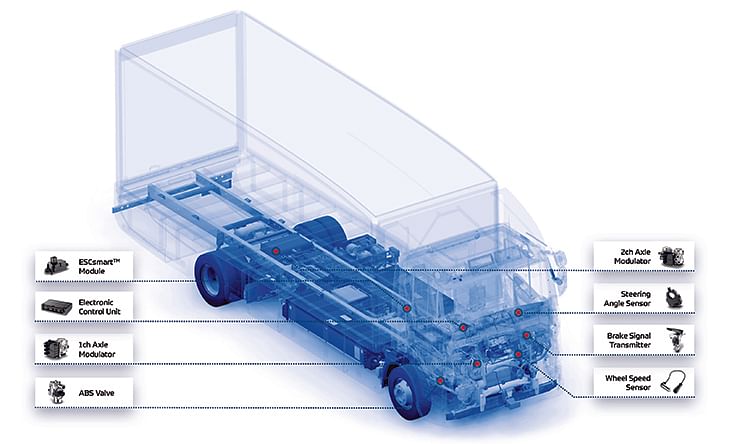ZF and Tevva develop four times more efficient regenerative braking system
ZF’s electronic braking system integrated with Tevva’s 7.5-tonne electric truck’s regenerative braking system helps recuperate up to 4x more energy than a traditional air brake system and optimise range
ZF has successfully worked with British electric vehicle manufacturer Tevva on the development of the regenerative braking system on its 7.5-tonne battery-electric truck.
Part of this involved ZF closely collaborating with Tevva engineers to integrate its Electronic Brake System (EBS) for use in zero-emission Tevva electric trucks.
ZF's Heiko Eggers, Head of EMEA Application Engineering for Braking and ADAS in the Division Commercial Vehicle Solutions, said: "Our broad product portfolio and systems competence, including ZF's standardised EBS, enables faster time-to-market for new, innovative market players such as Tevva. We look forward to seeing the first Tevva trucks on the road."
Tevva's Uzair Jilani, Lead Engineer, Drive and Brake Systems, said: "Working with ZF is a crucial step in the momentum we are building as a truck manufacturer. The system has been adapted for use with our regenerative system; when the brake pedal is pushed, most of the 'braking' is handled by regenerative, meaning that the drive system slows the vehicle down.”
"The conventional braking system is still needed to bring the truck to a complete stop, but this double layer of safety is an excellent aid to more efficient driving. It also means that the hardware undergoes less strain to extend the braking system's life in the long run."

Tevva's engineers successfully met a range of stringent testing criteria for the company's truck, working on fine-tuning the electric truck's vehicle control unit (VCU) and enhancing compatibility with the EBS. The result is a system that recuperates up to four times more energy than a conventional compressed air brake system, optimising the range of the Tevva truck. The implementation of EBS allows for a safe incorporation of regenerative braking up to 180 kW, whereas the traditional air brake system had limited passive regen to around 40 kW due to safety considerations. Testing of the adapted system, which took place at the ZF test track in Jeversen, Germany, involved a variety of conditions, gradients, and surface types.
Technological advancements allow a modern EBS system to control the blending of friction braking with the e-motor, reducing brake wear and tear. The system transfers the driver's deceleration request electronically to all braking system components to shorten response time, balance brake forces and provide ease of braking and efficient brake management.
Tevva’s 7.5-tonne battery-electric vehicle (BEV) has begun mass production at the company’s London facility this year. This will be followed by a 7.5-tonne hydrogen-electric truck, which benefits from a hydrogen range-extender that enhances vehicle range to 354 miles (570 km). The Tevva BEV offers up to 140 miles (227 kilometres) from its 105-kWh battery on a single charge and is ideal for last-mile and urban delivery fleets.
RELATED ARTICLES
Autoliv Plans JV for Advanced Safety Electronics With China’s HSAE
The new joint venture, which is to be located strategically near Shanghai and close to several existing Autoliv sites in...
JLR to Restart Production Over a Month After September Hacking
Manufacturing operations at the Tata Group-owned British luxury car and SUV manufacturer were shut down following a cybe...
BYD UK Sales Jump 880% in September to 11,271 units
Sales record sets the UK apart as the largest international market for BYD outside of China for the first time. The Seal...






 By Autocar Professional Bureau
By Autocar Professional Bureau
 14 Jun 2023
14 Jun 2023
 4999 Views
4999 Views










 Ajit Dalvi
Ajit Dalvi




